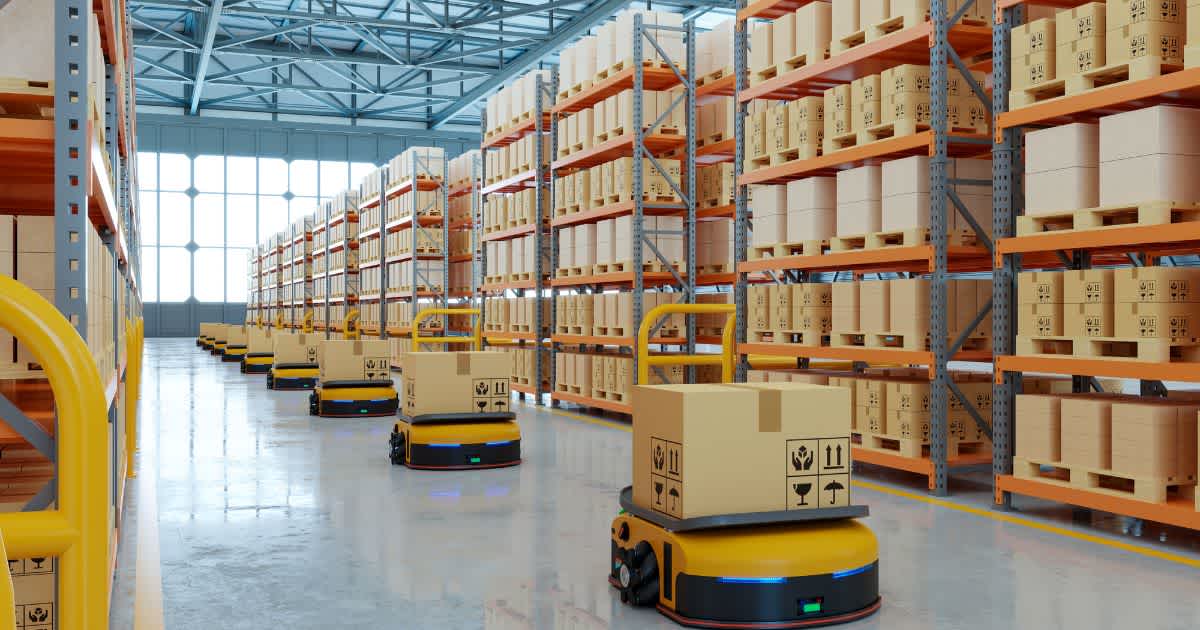Artificial intelligence in logistics
Reading Time: 5 min.

Artificial intelligence is fundamentally changing logistics. Where experience and gut feeling used to be the deciding factors, data-based systems now make precise decisions in real time. But is this really a revolution, or just the next logical step in digitalisation?
AI technologies that are changing logistics
Artificial intelligence (AI) describes systems that analyse large amounts of data, recognise patterns and independently derive decisions from them. Unlike traditional automation, AI can learn to adapt to changing conditions and continuously improve processes. Various technologies are used for this purpose:
Machine learning (ML): Systems that use historical data to make predictions or optimise processes.
Predictive analytics: Analyses that predict future events, such as demand or transport volumes.
Computer vision: Image processing systems that identify goods or detect quality defects.
Natural language processing (NLP): Language-based applications that simplify communication and data processing, such as chatbots or support systems.
All these technologies make logistics more intelligent and enable a new level of precision in procurement and supply chain management.
How AI is fundamentally changing supply chains
It is clear that artificial intelligence (AI) is fundamentally changing the way supply chains are planned, controlled and optimised. It analyses huge amounts of data, recognises patterns and reacts to changes in real time. This creates completely new opportunities to make logistics processes more efficient, sustainable and resilient.
Increased efficiency
AI systems take on numerous routine tasks, such as route planning, warehouse scheduling and inventory management. They analyse traffic flows, delivery times and capacities in order to make optimal decisions. This speeds up processes and increases precision at the same time. Employees gain time for strategic tasks and can focus more on process optimisation.
Cost reduction
The targeted use of artificial intelligence can reduce costs along the entire supply chain. AI-supported demand forecasts prevent excess inventory and reduce capital commitment. At the same time, the intelligent utilisation of transport resources and storage space ensures that resources are used efficiently. This significantly reduces logistics costs without compromising service quality.
Transparency
Real-time data creates a new dimension of clarity. AI systems link information from purchasing, production, transport and distribution and present it in an understandable way in dashboards or reports. Companies can immediately see where goods are located, which routes are busy and where bottlenecks are occurring. This transparency improves the management of complex supply chains and enables precise tracking of every shipment.
Sustainability
Artificial intelligence also makes an important contribution to logistics in ecological terms. It helps to avoid empty kilometres, bundle transports and reduce energy consumption. Forward planning makes routes more efficient, warehouse processes more resource-efficient and CO₂ emissions lower. In this way, AI helps companies to combine economic efficiency with ecological responsibility.
Resilience
Global crises, supply bottlenecks and fluctuations in demand demonstrate how important stable and adaptable supply chains are. AI-supported analyses identify risks at an early stage, for example through patterns in real-time data or external influencing factors such as weather or political events. This enables companies to react more quickly, activate alternative routes or adjust delivery strategies. In this way, artificial intelligence strengthens the resilience of the supply chain and measurably reduces the risk of failure.
AI in logistics practice: 5 examples of its application
Various application scenarios along the value chain demonstrate how AI works in logistics in practice:
1. Demand forecasts
By analysing historical sales figures, seasonal trends and external factors such as weather or economic data, AI systems can accurately predict demand. This enables companies to proactively manage their procurement and avoid overstocking or delivery bottlenecks.
2. Transport optimisation
AI calculates optimal routes taking into account traffic, weather, carbon footprint and delivery times. This reduces fuel consumption and delivery costs while increasing punctuality rates.
3. Warehousing and order picking
Modern distribution centres use autonomous vehicles, drones and robots with AI-controlled image recognition. They sort, transport and pick goods with a high degree of accuracy.
4. Quality control
Computer vision systems detect damage or deviations in products before they reach shipping. This reduces complaints and increases customer satisfaction.
5. Resource management
Through intelligent analysis of energy and material flows, AI helps to conserve resources and make processes more environmentally friendly. This is an important factor for sustainable supply chains.
Data quality is key
As great as the opportunities offered by artificial intelligence in logistics may be, the path to an intelligent supply chain is challenging. One of the biggest hurdles is data quality. AI systems can only be as reliable as the data on which they are based. Incomplete, outdated or incorrect information quickly leads to inaccurate forecasts and wrong decisions.
Added to this is the challenge of system integration: many companies have IT landscapes that have grown over time, in which new AI solutions can only be integrated with considerable effort. Interfaces must be created, data sources harmonised and processes rethought – a step that requires time, investment and specialised know-how.
The protection of sensitive information also plays a central role. In an increasingly networked logistics environment, data flows must be GDPR-compliant and secured against external attacks at all times in order to ensure trust and stability.
Change management: Focus on people
In addition to technology, human and organisational factors also pose a challenge. The successful use of artificial intelligence requires expertise from various disciplines, such as data science, IT security and process management. However, the shortage of skilled workers makes it increasingly challenging to fill such key positions.
Equally important is acceptance within the workforce: employees must understand that AI systems are not intended to replace them, but to support them. Only when companies actively accompany this cultural change and promote an open learning culture can the full potential of the technology be realised. Ultimately, the transition to AI-supported logistics will only succeed if technology, organisation and people are equally involved.
5 success factors for AI in logistics
Integrating artificial intelligence into existing logistics processes is not a sure-fire success. Taking a strategic approach and considering both technical and organisational aspects lays the foundation for sustainable success. The following five steps will help with implementation:
1. Clear definition of objectives
Before implementing AI solutions, companies should precisely define the problems they want to solve, such as inventory optimisation, route planning or quality control. A precise definition of objectives helps to focus the use of resources and make success measurable.
2. Ensure data quality
The performance of any AI stands or falls with the quality of the data. Only clean, structured and up-to-date information enables accurate forecasts and decisions. Companies should therefore centralise data sources, remove duplicate entries and establish clear responsibilities for data maintenance.
3. Launch small pilot projects
The best way to get started is with manageable projects. A limited pilot project – for example, on demand forecasting or route optimisation – quickly provides experience and shows where the greatest benefits can be achieved. Only after successful validation should scaling to other areas take place.
4. Involve employees
Artificial intelligence changes work processes and roles. Involving employees at an early stage promotes acceptance and reduces resistance. Training courses and practical training help to strengthen understanding of the technology and build trust.
5. Choose an experienced partner
The introduction of AI systems requires technical expertise and industry knowledge. An experienced partner can help analyse processes, select suitable tools and ensure smooth integration. This minimises risks and secures the investment in the long term.
The future of AI-supported supply chains
Artificial intelligence in logistics is much more than just a trend. It is the key to more efficient, sustainable and resilient supply chains. Those who invest today are actively shaping the future of logistics. Although development is still in its infancy, supply chains will increasingly operate autonomously in the coming years. With systems that can control themselves, learn from experience and respond to disruptions in real time.
Companies that embrace AI early on benefit twice over: they gain efficiency in their day-to-day business and gain strategic advantages in global competition. The important thing to remember is that you don't have to start big. Even individual pilot projects can show where potential can be tapped.
Line Up supports you in driving digitalisation and innovation in your supply chains – with customised solutions that intelligently combine data, processes and technology. Simply get in touch with us via our contact form.
Newsletter Registration
Sign up now for our free Line Up newsletter and stay up to date.





